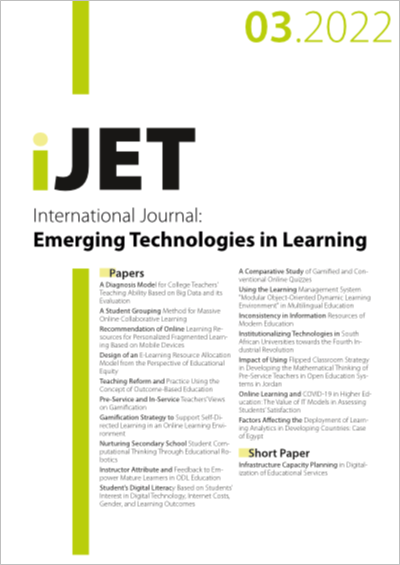Pre-Service and In-Service Teachers’ Views on Gamification
DOI:
https://doi.org/10.3991/ijet.v17i03.26761Keywords:
attitude, behavioral intention, educational games, experience, game mechanics, gamification, knowledge, openness, personality, teacherAbstract
Despite the popularity of gamification among academics due to its propensity to promote student motivation, engagement, and behavioral change, its use in formal education is still limited. We reached out to educators at all levels to examine their experience, attitude, familiarity with gamified teaching, and their personality, to see if teachers’ personal characteristics are related to the intention of implementing gamified teaching. 118 in-service and 102 pre-service teachers completed the BFI-S and the questionnaire developed for the study. Teachers predominantly assumed that gamification represents game-based learning, and more than half reported using some game elements in at least one of their lectures. While in general participants were welcoming towards gamified teaching, experienced teachers had a more positive attitude toward gamification compared to pre-service teachers. Attitude was a mediator between the intention to use and a presumption that gamification means using educational games, experience with gamification, and openness. In addition, past use significantly predicted intention to use even when accounting for attitude. Both in-service and pre-service teachers expressed a wish to learn more about gamification. The study identified another gap between theory and practice, showing a need for teachers to be informed more regularly about the latest pedagogical strategies and approaches.
Downloads
Published
2022-02-18
How to Cite
Sajinčič, N., Sandak, A., & Istenič, A. (2022). Pre-Service and In-Service Teachers’ Views on Gamification. International Journal of Emerging Technologies in Learning (iJET), 17(03), pp. 83–103. https://doi.org/10.3991/ijet.v17i03.26761
Issue
Section
Papers
License
Copyright (c) 2022 Nežka Sajinčič, Anna Sandak, Andreja Istenič

This work is licensed under a Creative Commons Attribution 4.0 International License.



